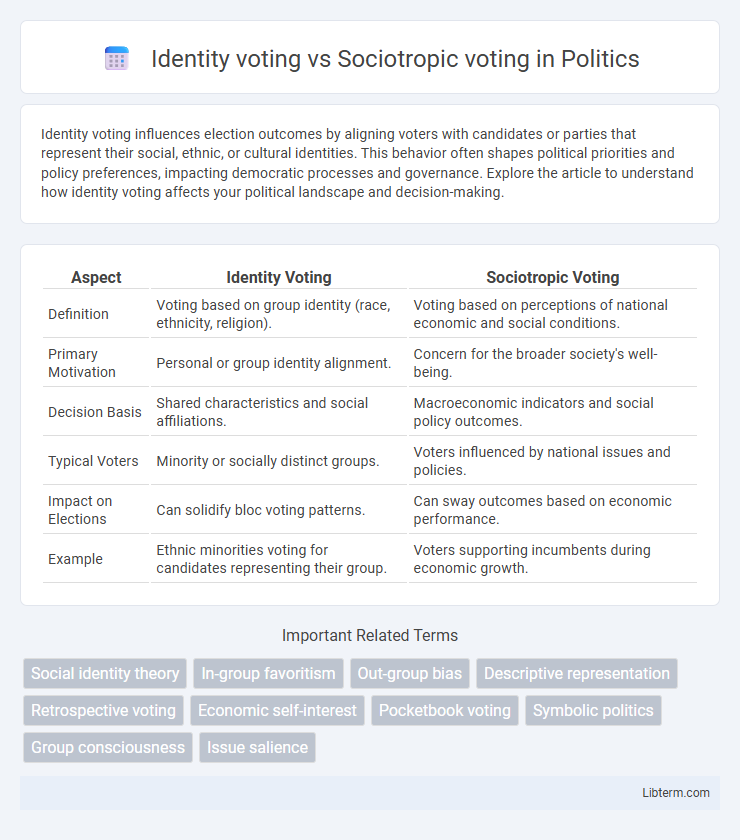Identity voting influences election outcomes by aligning voters with candidates or parties that represent their social, ethnic, or cultural identities. This behavior often shapes political priorities and policy preferences, impacting democratic processes and governance. Explore the article to understand how identity voting affects your political landscape and decision-making.
Table of Comparison
| Aspect | Identity Voting | Sociotropic Voting |
|---|---|---|
| Definition | Voting based on group identity (race, ethnicity, religion). | Voting based on perceptions of national economic and social conditions. |
| Primary Motivation | Personal or group identity alignment. | Concern for the broader society's well-being. |
| Decision Basis | Shared characteristics and social affiliations. | Macroeconomic indicators and social policy outcomes. |
| Typical Voters | Minority or socially distinct groups. | Voters influenced by national issues and policies. |
| Impact on Elections | Can solidify bloc voting patterns. | Can sway outcomes based on economic performance. |
| Example | Ethnic minorities voting for candidates representing their group. | Voters supporting incumbents during economic growth. |
Understanding Identity Voting
Identity voting occurs when individuals cast their ballots based primarily on group affiliations such as race, ethnicity, religion, or social class, reflecting a deep connection to shared experiences and collective identities. This form of voting contrasts with sociotropic voting, which emphasizes evaluations of the national economy or broader societal conditions rather than personal group interests. Understanding identity voting requires recognizing how social identities shape political behavior, influence party alignment, and reinforce loyalty within specific demographic groups.
Defining Sociotropic Voting
Sociotropic voting refers to electoral decisions based on voters' perceptions of the overall economic and social conditions affecting their community or country, rather than on personal circumstances. This type of voting behavior contrasts with identity voting, where choices are influenced primarily by an individual's group affiliations such as race, ethnicity, or religion. Understanding sociotropic voting highlights the importance of collective welfare evaluations in shaping political preferences and election outcomes.
Key Differences Between Identity and Sociotropic Voting
Identity voting centers on individuals casting ballots based on personal group identities such as race, religion, or ethnicity, while sociotropic voting emphasizes voters' perceptions of overall economic and social conditions affecting society. The key differences lie in the motivation behind the vote: identity voting is driven by group affiliation and collective experiences, whereas sociotropic voting is influenced by assessments of national economic performance and policy outcomes. Moreover, identity voting reflects emotional and symbolic connections, whereas sociotropic voting reflects pragmatic evaluations of societal wellbeing.
Historical Evolution of Voting Behaviors
Identity voting has evolved as individuals increasingly align their political choices with social groups based on race, ethnicity, religion, or class, reflecting a deeper psychological attachment to group identity. Sociotropic voting emerged prominently in the mid-20th century as voters prioritized perceptions of the national economy and societal well-being over personal circumstances when making electoral decisions. Historical shifts from candidate-centered to issue-centered politics have heightened the influence of sociotropic considerations, while identity voting has gained significance amid rising social movements and demographic changes.
Psychological Drivers Behind Identity Voting
Identity voting is primarily driven by psychological factors such as group affiliation, social identity, and emotional attachment to a community or social category. Voters often prioritize candidates who represent their racial, ethnic, religious, or ideological group, seeking affirmation and solidarity through political choices. This form of voting reflects deep-seated psychological needs for belonging and self-concept, distinct from sociotropic voting which focuses on evaluations of the broader economic or social environment.
Economic Factors Influencing Sociotropic Voting
Sociotropic voting is primarily influenced by voters' perceptions of the national economy, including unemployment rates, inflation, and overall economic growth, which shape their electoral choices beyond personal financial concerns. Economic indicators such as GDP fluctuations and fiscal policies significantly impact sociotropic voter behavior, as individuals evaluate government performance based on collective economic outcomes. Unlike identity voting, which centers on social group affiliations, sociotropic voting underscores the importance of macroeconomic conditions in determining electoral decisions.
Impact on Election Outcomes
Identity voting, where voters choose candidates based on social group affiliations such as race, ethnicity, or religion, often leads to strong, predictable blocs that can decisively influence election outcomes by consolidating support around identity-aligned parties or candidates. Sociotropic voting, driven by perceptions of the overall economic and social conditions rather than personal circumstances, shapes election results by swaying voters toward parties they believe will improve national well-being. The interaction between identity-based loyalty and sociotropic evaluations can create complex electoral dynamics, affecting candidate strategies and policy priorities to address both group interests and broader societal concerns.
Case Studies: Identity Versus Sociotropic Voting Patterns
Case studies reveal that identity voting often dominates in ethnically or culturally polarized societies, where voters prioritize group affiliation over policy outcomes. Sociotropic voting emerges strongly in economically interconnected nations, with individuals weighing national economic conditions and public welfare in their electoral choices. Comparative analyses show that identity voting correlates with increased political polarization, while sociotropic voting aligns with pragmatic assessments of government performance.
Implications for Political Campaign Strategies
Identity voting emphasizes voters' alignment with social group characteristics such as race, religion, or ethnicity, prompting campaigns to tailor messages that resonate with specific demographic identities. Sociotropic voting focuses on voters' evaluation of the overall economic and social conditions, encouraging campaigns to highlight policy performance and national issues affecting voter welfare. Effective political strategies integrate both approaches by balancing targeted identity appeals with broader policy narratives to maximize voter engagement and support.
Future Trends in Voter Decision-Making
Future trends in voter decision-making indicate a growing interplay between identity voting and sociotropic voting, with demographic shifts amplifying the role of identity-based preferences tied to ethnicity, gender, and social groups. Increasing political polarization and the prevalence of social media are reinforcing sociotropic considerations, as voters evaluate economic performance and national issues through the lens of collective wellbeing. Advances in data analytics and targeted campaigning are expected to further blend these voting behaviors, making voter decisions more complex and multifaceted in upcoming elections.
Identity voting Infographic

 libterm.com
libterm.com